Class 9 History Chapter 1 Extra Question Answers - The French Revolution
Q1. What was the subsistence crisis? Why did it occur in France during the Old Regime?
Ans: The subsistence crisis is a serious situation where people's basic means of survival are threatened. In France, this crisis arose due to several factors:
- The population increased from about 23 million in 1715 to 28 million in 1789.
- This growth led to a higher demand for food grains.
- Food production could not meet this demand, causing the price of bread, a staple for many, to rise sharply.
- Wages for workers did not increase at the same rate as food prices, widening the gap between the rich and the poor.
- Natural disasters, such as droughts and hail, further reduced harvests, worsening the crisis.
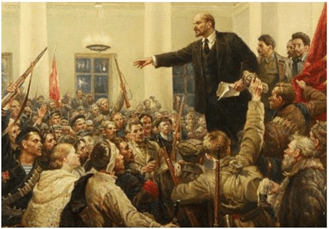 Subsistence Crisis
Subsistence Crisis
Q2. What was the system of voting in the Estates-General? What change did the Third Estate want in this system?
Ans: Voting in the Estates-General was based on the principle that each estate received one vote:
- The First Estate (Clergy) had one vote.
- The Second Estate (Nobility) had one vote.
- The Third Estate, which represented the common people, was outvoted despite having more members.
Members of the Third Estate sought a change in this system:
- They wanted voting to occur by the assembly as a whole.
- Each member should have one vote, reflecting democratic principles.
Q3. Describe the incidents that led to the storming of the Bastille.
Ans: While the National Assembly was drafting a constitution at Versailles, France faced significant turmoil:
- A harsh winter resulted in a poor harvest, causing bread prices to rise.
- Bakers hoarded supplies, leading to long queues at bakeries.
- Angry crowds, especially women, stormed shops demanding bread.
- Simultaneously, the king ordered troops to move into Paris.
On 14 July 1789, an agitated crowd stormed the Bastille, a fortress-prison symbolising the king's despotic power:
- The commander was killed, and all seven prisoners were released.
- The Bastille was demolished, with its stones sold as souvenirs.
Q4. Describe how the new political system of constitutional monarchy worked in France.
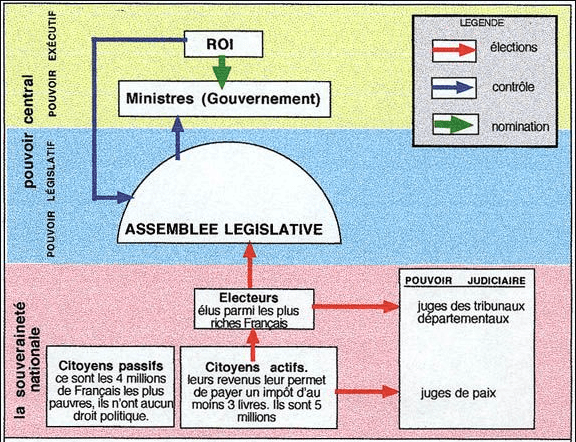 The Political System of Constitutional Monarchy 1791, France
The Political System of Constitutional Monarchy 1791, France
Ans: The Constitution of 1791 introduced a new political system in France, known as a constitutional monarchy. Its main features included:
- Law-Making Power: The National Assembly, indirectly elected, was responsible for creating laws. Citizens voted for electors, who then selected the Assembly.
- Voting Rights: Only men over 25 who paid taxes equivalent to three days' wages were classified as active citizens and allowed to vote. All others, including women, were considered passive citizens.
- Taxpayer Qualifications: To be an elector or a member of the Assembly, one had to be among the highest taxpayers.
- Separation of Powers: The constitution aimed to limit the monarch's powers by distributing authority among the legislature, executive, and judiciary.
Q5. What were ‘natural and inalienable rights’
Ans: The Constitution began with a Declaration of the Rights of Man and Citizen. Key rights recognised as natural and inalienable include:
- The right to life
- Freedom of speech
- Freedom of opinion
- Equality before the law
These rights are inherent to every human being from birth and cannot be taken away. It is the state's duty to protect each citizen's natural rights.
Q6. Why did slavery begin and why was it abolished in French colonies?
Ans: The slave trade began in the 17th century, mainly in the Caribbean colonies of Martinique, Guadeloupe, and San Domingo. These colonies were vital for producing goods like sugar and coffee. However, Europeans were often reluctant to work in these remote areas, resulting in a labor shortage on plantations.
Throughout the 18th century, there was little criticism of slavery in France. The National Assembly debated extending rights to all French subjects, including those in the colonies but did not pass any laws due to fears of backlash from businessmen dependent on the slave trade.
In 1794, the Convention enacted a law to free all slaves in French overseas territories, but this was only a temporary measure. Napoleon later reinstated slavery. Ultimately, slavery was abolished in French colonies in 1848.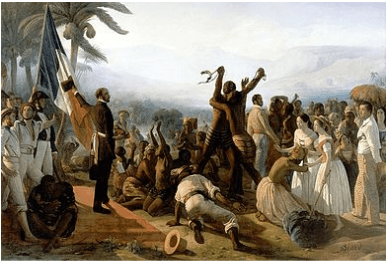 Slavery Abolition Act
Slavery Abolition Act
Q7. What is a revolution? In what ways did the French Revolution mean different to different people?
Ans: A revolution is an effort by a large group of people to change their country's government, often through violent means. The French Revolution had different implications for various groups:
- The Third Estate, which included common people, gained significantly from the Revolution.
- The clergy and nobility lost power and had their lands confiscated.
- Lower middle-class individuals, such as artisans and workers, experienced improvements in their status.
- Many, including clergy, feudal lords, nobles, and women, felt disappointed by the outcomes.
- The Revolution did not achieve true equality, as voting rights were not extended to everyone; women only gained the right to vote in 1946.
Q8. What was the importance of the Declaration of the Rights of Man?
Ans: The Declaration of the Rights of Man, adopted by France's National Constituent Assembly in August 1789, was significant for several reasons:
- It challenged the existing European system based on privileges.
- It established key civil rights, including:
- Equality among all individuals
- Liberty for personal freedoms
- Fraternity to promote solidarity
- Despite its acclaim as the 'gospel of modern times', it notably excluded many from these rights.
Q9. How was the Church responsible for the French Revolution? Mention three points.
Ans: The Church significantly contributed to the conditions leading to the French Revolution for several reasons:
- The clergy, as part of the First Estate, enjoyed many privileges without responsibilities, causing resentment among the Third Estate.
- The Church owned a vast amount of land and collected tithes from peasants, increasing their financial burden.
- In addition to tithes, the Church imposed various other dues, further straining the resources of the common people.
Q10. How did the peasants contribute to the outbreak of the French Revolution? Explain.
Ans: The peasants played a crucial role in the French Revolution, making up about 90% of the population. However, only a small percentage owned the land they worked on. They faced several hardships:
- Peasants paid numerous taxes, while the nobility collected feudal dues.
- They were obligated to perform services for their lords, including working in their homes and fields, serving in the army, and assisting with road construction.
- This exploitation, combined with their dire living conditions, led to widespread dissatisfaction and revolt.
Additionally, peasants suffered during the Subsistence Crisis, which frequently affected France during the Old Regime.
Q11. Who formed the National Assembly? On which day is ‘Bastille Day’ celebrated and why?
Ans: The National Assembly was established by representatives of the Third Estate on 20 June 1789 at Versailles. They proclaimed themselves a National Assembly and committed to remain united until they had created a constitution for France.
Bastille Day is celebrated on 14 July to mark the storming of the Bastille prison. This event symbolised the end of the king's absolute power and the beginning of the people's sovereignty in France.
Q12. Name three famous writers and philosophers who influenced the French Revolution. What were their ideas?
Ans: Jean Jacques Rousseau: He believed that man is naturally good, but society corrupts this goodness, leading to anxiety and unhappiness.
Mirabeau: He was influential through his journal and powerful speeches, especially at Versailles, where he advocated for change.
Voltaire: He critiqued the evils of the Church and government, promoting ideas of freedom and justice.
Q13. Who were the sans-culottes? Who were able to control them in the end?
Ans: The sans-culottes were a group closely linked to the Jacobin movement during the French Revolution. They primarily came from the less affluent segments of society, including:
- Small shopkeepers
- Artisans (e.g., shoemakers, pastry cooks, watchmakers)
- Servants and daily-wage workers
To differentiate themselves from the wealthy, who wore knee breeches, the sans-culottes adopted long striped trousers. This choice symbolised the end of noble power, leading to their name, which means "those without knee breeches."After the fall of the Jacobins, control shifted to the wealthier middle class.
Q14. Which single event turned the revolution into a Reign of Terror? Describe the role of Robespierre in it.
Ans: The period from 1793 to 1794 is known as the Reign of Terror. During this time, Robespierre enforced strict measures to control the population and punish those he viewed as enemies of the republic. His actions included:
- Arresting and imprisoning nobles, clergymen, and political opponents.
- Conducting trials through revolutionary tribunals.
- Executing those found guilty by guillotine.
Robespierre's relentless pursuit of these policies led even his supporters to call for moderation. Ultimately, in July 1794, he was arrested and executed the following day.
Q15. Describe the role of the Bourbon kings in the French Revolution.
Ans: The Bourbon kings significantly influenced the events leading to the French Revolution due to their extravagant lifestyle and poor financial management. Key points include:
- The kings maintained a lavish court at Versailles.
- Years of costly wars drained France's finances, leaving the treasury empty.
- By the time Louis XVI became king at 20, France was over 2 billion livres in debt.
- To manage expenses, Louis XVI raised taxes, causing widespread discontent.
- Rising prices, food shortages, and low wages widened the gap between the rich and the poor.
Q16. How was the French Society organised? What privileges did certain sections of society enjoy?
Ans: French society in the eighteenth century was organised into three Estates:
- First Estate: Clergy
- Second Estate: Nobility
- Third Estate: Common people, including businessmen, traders, lawyers, peasants, and workers
Key points about this structure include:
- Only members of the Third Estate paid taxes, bearing the heaviest tax burden.
- The nobility and clergy enjoyed privileges, such as exemption from taxes.
- Approximately 90% of the population were peasants, most of whom did not own the land they worked.
- About 60% of the land was owned by the nobility, the Church, and wealthier members of the Third Estate.
- The rise of an educated middle class, influenced by philosophers like Locke and Rousseau, contributed to revolutionary changes.
Q17. Write the importance of Napoleon Bonaparte in the History of France and the world.
Ans: Napoleon Bonaparte significantly influenced the history of France and the world through various key contributions:
- He saw himself as a moderniser of Europe.
- Introduced important laws, including:
- Protection of private property
- A uniform system of weights and measures using the decimal system
- Spread revolutionary ideas of liberty and modern laws across conquered territories.
- Initially regarded as a liberator, he later became seen as an invader.
- His military skills established him as a great general.
- Napoleon's legacy inspired democratic movements and the abolition of feudal systems in Europe and beyond.
Q18. How did Robespierre propose to bring about equality in the French society?
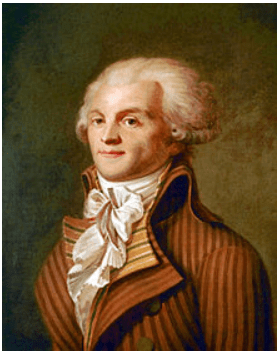 Maximilien Robespierre
Maximilien Robespierre
Ans: Robespierre sought to establish equality in French society through strict control and punishment. His main measures included:
- Setting a maximum limit on wages and prices.
- Rationing essential foods like meat and bread.
- Forcing peasants to transport grain to cities, selling it at government-fixed prices.
- Prohibiting the use of expensive white flour; all citizens had to consume equality bread, made from whole wheat.
- Promoting equality in language by addressing everyone as Citoyen (Citizen) and Citoyenne.
- Closing churches and repurposing their buildings as barracks or offices.
Robespierre's extreme policies led even his supporters to call for moderation. Ultimately, he was arrested and executed by guillotine in July 1794.
Q19. What was the Estates General? Which demand of the Third Estate did Louis XVI reject?
Ans: The Estates General was a political assembly in France, consisting of representatives from three estates:
- First Estate: Clergy
- Second Estate: Nobility
- Third Estate: Commoners, including peasants and educated professionals
The Third Estate demanded that voting be done by individual votes instead of by estate, allowing each member one vote. This proposal was rejected by King Louis XVI.
In protest, members of the Third Estate walked out and declared themselves the National Assembly, pledging to draft a constitution for France.
Q20. What was the contribution of Mirabeau and Abbe Sieyes to the French Revolution?
Ans: On 20 June 1789, representatives of the Third Estate met in an indoor tennis court at Versailles, led by Mirabeau and Abbé Sieyès. Their key contributions included:
- Mirabeau, from a noble family, pushed for the abolition of feudal privileges. He used his journal and delivered powerful speeches to inspire the crowds.
- Abbé Sieyès, originally a priest, wrote the influential pamphlet What is the Third Estate?, challenging the role and rights of the Third Estate in society.
These actions were crucial in the early stages of the French Revolution, motivating the Third Estate to declare themselves a National Assembly. They committed to drafting a constitution to limit the monarch's powers.
Q21. What were the causes for the empty treasure of France under Louis XIV? Assess any three causes.
Ans: Several factors led to the empty treasury of France under Louis XIV:
- Long wars: Extended conflicts drained financial resources, particularly the support for the American colonies against Britain.
- Rising debt: The war increased the existing debt by over a billion livres, bringing it to more than 2 billion livres.
- High interest rates: Lenders charged up to 10% interest on loans, forcing the government to allocate a large portion of its budget to interest payments.
Q22. What is the significance of ‘The Tennis Court Oath’ in the French Revolution?
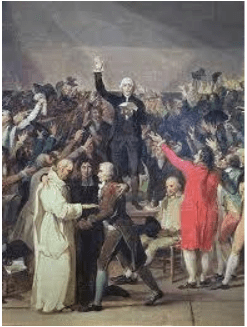 Tennis Court Oath
Tennis Court Oath
Ans: The representatives of the Third Estate viewed themselves as the voice of the entire French nation. On 20 June 1789, they gathered in an indoor tennis court at Versailles, declaring themselves a National Assembly. They vowed not to leave until they had created a constitution to limit the monarch's powers.
- Led by Mirabeau and Abbé Sieyès.
- This event marked a pivotal moment in the French Revolution.
- Their actions symbolised the demand for a more democratic government.
Q23. Write three main features of the French constitution of 1791.
Ans: The National Assembly completed the constitution in 1791 with the following main features:
- Limiting monarch's powers: The constitution separated powers among the legislature, executive, and judiciary, establishing France as a constitutional monarchy.
- Law-making authority: The National Assembly, elected indirectly by citizens through electors, held the power to create laws.
- Natural rights: It recognised rights such as the right to life, freedom of speech, and equality before the law as 'natural and inalienable', which the state was obliged to protect.
Q24. ‘The inequality that existed in the French society in the Old Regime became the cause of French Revolution.’ Justify the statement by giving three suitable examples.
Ans: The inequality in French society during the Old Regime significantly contributed to the French Revolution. Here are three key examples:
- Population Disparity: Peasants comprised about 90% of the population but owned only a small fraction of the land. In contrast, 60% of the land was owned by the nobility, the Church, and wealthier members of the Third Estate.
- Tax Exemptions: The clergy (First Estate) and the nobility (Second Estate) were exempt from paying taxes. This meant the entire tax burden fell on the Third Estate, which included peasants and the middle class.
- Feudal Obligations: Nobles imposed feudal dues on peasants, requiring them to work on their lands or serve in the army. This exploitation deepened the resentment among the Third Estate.
Q25. Why did King Louis XIV conclude to increase taxes? Assess any three points.
Ans: Upon his accession, Louis XIV faced an empty treasury due to:
- Long years of war that depleted France's financial resources.
- Support for the American colonies during their fight for independence, adding significant debt.
- Overall debt exceeding 2 billion livres, leading to higher interest rates on loans.
To manage these financial challenges, Louis XIV had to increase taxes.
|
55 videos|525 docs|78 tests
|
FAQs on Class 9 History Chapter 1 Extra Question Answers - The French Revolution
| 1. What were the main causes of the French Revolution? |  |
| 2. What were the key events during the French Revolution? |  |
| 3. How did the French Revolution impact the rest of the world? |  |
| 4. What role did Napoleon Bonaparte play in the French Revolution? |  |
| 5. What were the outcomes of the French Revolution? |  |






















